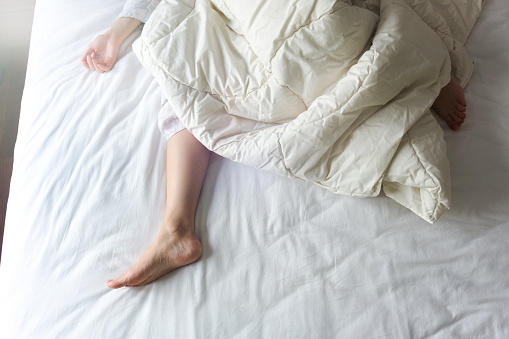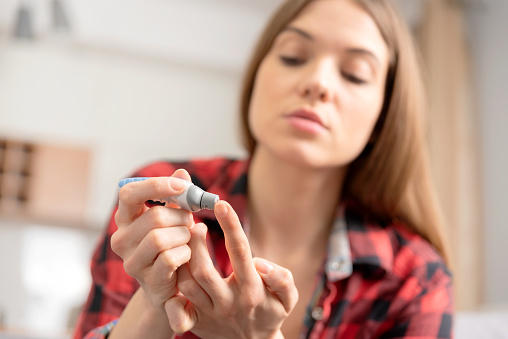Special Offer! Extra 5% Off for Prepaid Orders
Special Offer! Extra 5% Off for Prepaid Orders

More and more people these days are suffering from diabetes or prediabetes related problems. If you are not aware about it, diabetes is a condition which results in extremely high glucose levels in the blood. There are two major types of diabetes: type 1 and type 2. Type 1 diabetes is a genetic disorder. It is a chronic condition in which the pancreas produces no or a little amount of insulin. This is usually detected early in life. Type 2 diabetes on the other hand is also a chronic condition which impacts the blood sugar processes of the body. For the purpose of this article, we will be focusing on type 1 diabetes, but if you want to know more about the type 2 disease, head on over to our website for more articles on that.
A general consensus of people suffering from type 1 diabetes is that they experience certain problems with sleep. The issues associated with it are restlessness, frequent urination, breathing problems during sleeping etc. While these seem like benign problems, for people with diabetes, these can lead to disaster. Problems like resistance to insulation and difficulty in focusing the mind can be direct effects of the lack of sleep. This can ultimately make it a challenge to manage a serious and chronic condition like diabetes in the long term. If you suffer from sleep related issues and you are a patient of diabetes, then do read the full article to know all about how to remedy this situation.
- Set The Optimum Temperature:
One of the major reasons for lack of quality sleep and even restlessness in some cases, which usually goes undetected, is not having the optimum temperature while sleeping. The human body needs an optimum temperature of about 18 degrees celsius to be able to have the most restful sleep. If you have a thermostat in your home, you can easily manage the temperature of the room that you are going to be sleeping in. But if that is not the case, you can manage the temperature through an air conditioner in the summers and through a radiator in the winters.

- Take A Warm Bath Before Sleeping:
A helpful tip in getting yourself right to sleep as soon as you hit the bed is to take a warm bath before sleeping. Having a warm bath, especially in the winter season, can do wonders in helping you to relax and can ultimately put you right to sleep. It can aid in washing off the stress and the worry of the day additionally. Moreover, your body tends to become more restful once it reaches the optimum temperature to sleep in (as referred to in the last point). Taking a temperature controlled bath can help a lot in such a case. Bake this habit into your everyday routine to signal to your brain that when you take a night time bath, it knows that it is time to sleep.
- Physical Activities Help:
Doing some kind of physical activity daily can not only help you to manage a chronic condition like diabetes well, but can also aid you in being able to catch a good night of sleep. Moving your muscles and body can help to tire you out much more than not engaging in any physical activity at all. Getting tired throughout the day will ensure that you go off to sleep at the right time and in a restful way. You also have more chances of getting an uninterrupted night of sleep if you make a habit of working out on a daily basis.

- Calming Activities Before Bed:
Most of the times when we are not able to get ourselves to sleep, the culprit is our mind not being able to relax enough in order to do that. But this is not a big cause of worry as there is quite a simple way to help your mind to let go of its daily stresses as well as worries. Activities like doing yoga, writing in a journal and practicing meditation can go a long way in ensuring that you are able to go off to sleep fast. Ideally you should practice these activities right before bed time to get the most benefit out of them.
- Check Blood Sugar:
Doctors suggest that it is a good idea for diabetes patients to check their blood sugar levels right before they go to bed. You can keep a good quality blood glucose meter kit handy on your bedside table to make a habit of it in the long run. This not only helps you to notice any abnormalities in your blood sugar levels at once, but can also aid in putting your mind at ease if the readings are nothing out of the ordinary. Even though it is a good idea to regularly keep a check on your blood glucose levels throughout the day, the importance of checking these right before you go off to sleep can not be undermined in any way.

- Keep Track Of Your Sleep Cycles:
If you struggle a lot with maintaining your sleep cycles or staying asleep for the entire night, then it would do you good to keep a conscious and physical track of everything related to your slumber. Some important things to note here will be at what time you go to sleep, at what time do you usually wake up, how many times do you tend to wake up in the nights, how many times something disrupts your sleep cycles and what disrupts them the most. Keeping a track of all this will not just help you in detecting patterns and fixing them but you can also show these to your doctor for easier diagnosis.
- Limit Fluids:
If you have a habit of waking up multiple times through the night just to urinate, then it would do you good to heed this tip. Try to limit your fluid and caffeine intake in the evening time. A lesser amount of caffeine in your body will mean easy falling to sleep at bed time and less fluids will mean that you will not need to get up as many times to relieve yourself which can severely disrupt your sleep so many times throughout the night.

There are not many aspects which you can control about a chronic disease like diabetes. All you can do is to make efforts to manage your condition well. Following all of the steps mentioned above can help you in getting a good amount of restful and uninterrupted sleep on a daily basis. This can keep you healthy and happy in the long run. Do share this article with your near and dear ones who may be struggling with the prospect of sleep whilst being afflicted with diabetes.